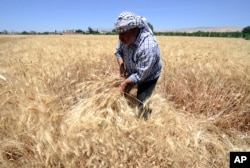Food shocks, or sudden losses of crops, livestock or fish, due to the combination extreme weather conditions and geopolitical events like war, increased from 1961 to 2013, said researchers at The University of Tasmania in a report released Monday.
Researchers saw a steady increase in shock frequency over each decade with no declines.
The report, published in Nature Sustainability, said that protective measures are needed to avoid future disasters.
The authors studied 226 shocks across 134 countries over the last 53 years and, unlike previous reports, examined the connection between shocks and land-based agriculture and sea-based aquaculture.
"There seems to be this increasing trend in volatility," said lead author Richard Cottrell, a PhD candidate in quantitative marine science at the University of Tasmania in Australia. "We do need to stop and think about this."
Extreme weather events are expected to worsen over time because of climate change, the report said, and when countries already struggling to feed their populations experience conflict, the risk of mass-hunger increases.
The researchers found that about one quarter of food resources are accessed through trade, and many countries could not feed their populations without imports, making them particularly vulnerable to food shocks of trading partners.
As the frequency of shocks continues to increase, it leaves what Cottrell called "narrowing windows" between shocks, making it nearly impossible to recover and prepare for the next one.
The report said trade-dependent countries must find ways to store food in preparation for inevitable shocks elsewhere.
Countries must invest in "climate-smart" practices like diversifying plant and animal breeds and varieties and enhance soil quality to speed recovery following floods and droughts, the report said.
"We need to start changing the way we produce food for resiliency," Cottrell said, adding that he had yet to see much action being taken by wealthy food-producing countries. "Because we are going to see a problem."
The report was released the same day the United Nations Food and Agriculture Organization reported findings on conflict and hunger.
That report stated that around 56 million people across eight conflict zones are in need of immediate food and livelihood assistance.






